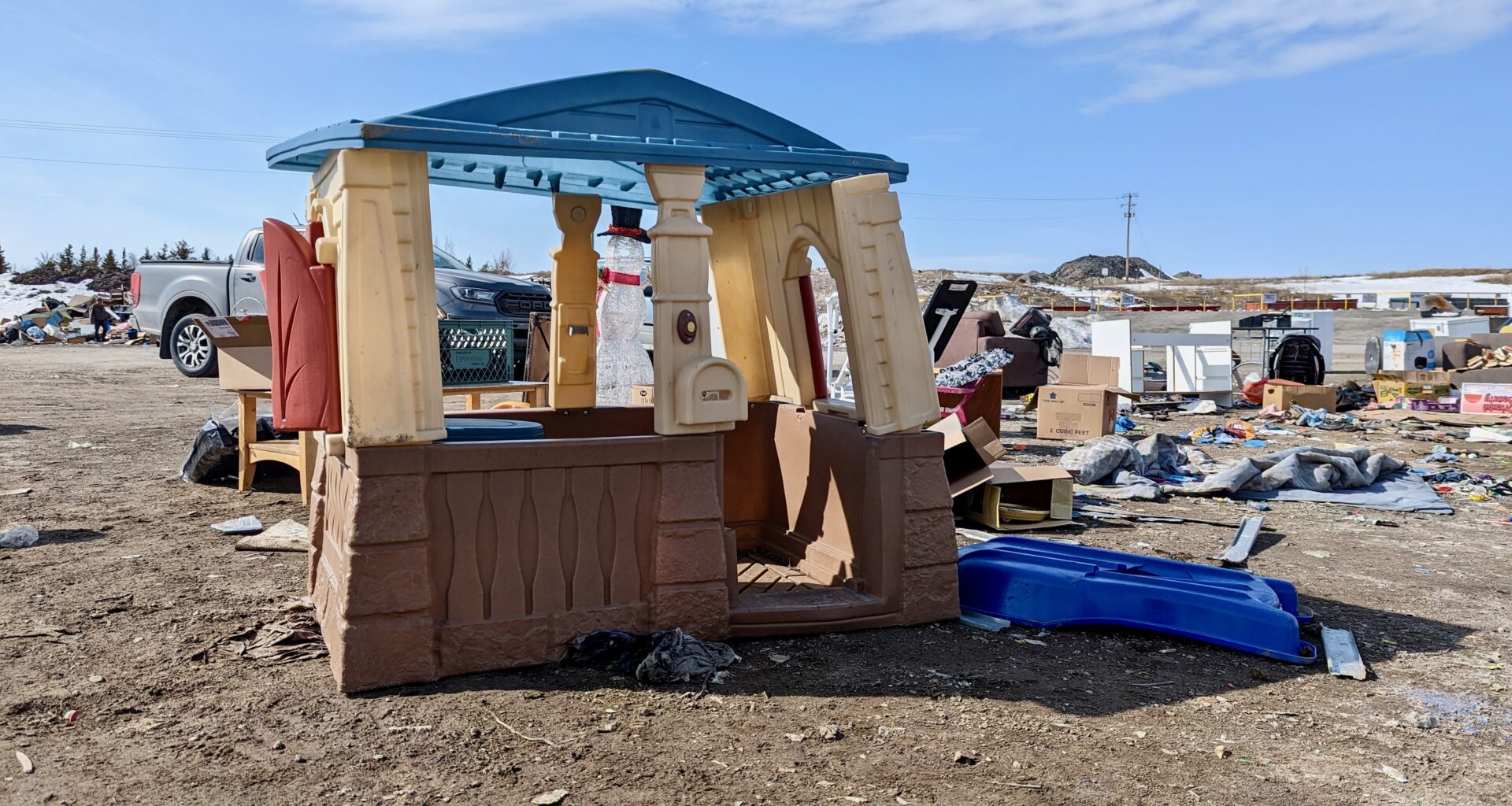City of Yellowknife staff want to stop holding amnesty days at the solid waste facility, saying the “chaotic” initiatives cost too much, cause safety concerns and undermine efforts to make the most of the landfill.
An amnesty day can cost more than $30,000, staff told councillors on Monday, at a time when the landfill is running a deficit of $1 million a year.
At one amnesty day in 2023, nearly 700 vehicles turned up – including 138 who simply came looking for things to salvage.
Chris Vaughn, the city’s manager of sustainability and solid waste, said the sheer influx of people overwhelms staff trying to ensure only appropriate materials are dumped. In the past, highly flammable objects like propane tanks have ended up in completely the wrong areas.
Vaughn suggested it’s not out of the question that this kind of incident is causing sub-surface landfill fires.
City staff said a voucher system could replace amnesty days – allowing residents to play a get-in-the-dump-free card twice a year, with some constraints – but most councillors seemed ready to cancel amnesty days outright.
No final decision has been made. Mayor Ben Hendriksen made a point of saying now is the time to talk to councillors if you’re a resident with strong feelings on the issue, which will be brought forward at a future council meeting for a formal vote.
Here’s a guide to what was discussed on Monday.
What are city staff proposing?
Solid waste manager Vaughn and public works director Chris Greencorn want council to let the city stop offering amnesty days at the dump.
Failing that, they are suggesting giving every household on the existing waste cart system two vouchers a year that would act as a replacement for amnesty days.
Option three is leaving things as they are, but Vaughn said that wouldn’t address the chaos generated by traffic on amnesty days, the demands on staff (who must work significant overtime to make those days happen), and what he called the “undervaluing” of the landfill, which isn’t bringing in the revenue it needs to break even.
Why is there an issue?
The solid waste facility is running a million-dollar annual deficit. That’s a slight improvement on recent years, but amnesty days are a big money-loser and staff say the clean-up is “brutal.”
In a typical week, Vaughn said, the landfill has five to six operators. They are stretched enough with day-to-day work, he said, without amnesty days – which require that they “supervise residents who are not familiar with our site.”
So there’s a safety risk with hundreds of people all trying to get into the dump on one day, or even one weekend, to dump materials.
Then there’s the question of what they’re dumping. Even on an amnesty day, you can’t bring in absolutely anything you want. It still has to be regular residential waste, you just don’t pay the normal tipping fee.
When a bunch of people turn up, not everything can be carefully supervised, so problematic things – flammable or hazardous materials, for example – can end up in the wrong place and cause a separate safety concern.
Even after a regular weekend with no amnesty day, Vaughn said, staff would need all of Monday to clean up the mess left behind by people getting rid of items. An amnesty day means “a lot more” work than that.
The spring 2023 amnesty day lost the city nearly $33,500 according to a briefing note prepared for councillors. Vaughn, in a passionate opening statement to council, said the solid waste facility can’t keep losing money when cash is needed to run it properly and costs are going up.
“The landfill has evolved and continues to evolve. It is no longer a dump,” he said.
“It’s one of the city’s most valuable assets and every decision either optimizes or undermines its value. The municipality should be recovering the cost of landfill operations under the user-pay model.”
Is keeping the status quo an option?
Keeping things as they are was listed as one of three options council can choose, but Vaughn said that would do nothing to address any of his concerns.
In the discussion that followed, no councillor seemed interested in preserving the status quo.
What was the council vibe?
Council seemed only lukewarm on the voucher issue. In general, councillors appeared ready to flip the switch and wipe out amnesty days.
“My gut instinct was full support of cancelling amnesty,” declared Hendriksen, the mayor.
His main concern was whether that would mean an increase in illegal dumping. City staff said they are tracking the cost of illegal dumping and will recover those costs one way or the other.
“If illegal dumping continues to happen, either user fees will go up to cover those costs, or the solid waste levy will go up to cover those costs, or property taxes will go up to cover those costs,” said Greencorn. “We’d prefer that not to happen, but that’s just the reality of the world.”
Hendriksen also said he’d be fine with trialling the vouchers until the next municipal election, in late 2026, if need be.
Garett Cochrane said the eventual cancellation of amnesty days was “inevitable” but he, too, would support the vouchers as a transitional measure if need be. He expressed concern that the current amnesty days seemed to create conditions that could lead to subsurface fires.
Steve Payne said the bigger picture behind the move toward cancelling amnesty days was “really positive.” He asked whether a system that used software to give people an allowance each year could be used. The city suggested that’s an expensive and complex system to introduce, but it might one day be possible.
“I am in full support of removing amnesty. Just cut and dried for me,” said Stacie Arden-Smith. Tom McLennan expressed a similar sentiment.
“I understand the concerns around illegal dumping, but I don’t think we can base our decision on fear around that,” McLennan said.
“I think that is a very small minority of people. As individuals, we need to take responsibility for our actions and the waste we produce.”
In one of the rare instances where every single council member expressed a view, Rob Foote seemed to lean toward scrapping amnesty days, as did Ryan Fequet, who chaired Monday’s discussion.
Rob Warburton wondered if a voucher system might lead to more use of the facility, not less. Staff said how often people use the facility in a year isn’t the issue – it’s having everyone arrive at once. If those visits are more spread out, staff can pay more attention to individuals and the situation will be more manageable.
Cat McGurk said she was “generally supportive” of ending amnesty days, but had one concern that we’ll come back to below.
Has a final decision been made?
No. If you feel strongly, talk to a city councillor. The next scheduled full council meeting at which this could come up for a formal vote is on August 25.
So how would these vouchers work?
Amnesty days would be dropped and you’d be given two vouchers a year if your home is on the existing black and green cart network.
Each voucher would get you a free trip into the solid waste facility with some regular residential waste. The vouchers would expire at the end of the calendar year, so you couldn’t hoard them. Once the city’s new weigh-out scale comes online, you would be subject to a limit of 150 kg of waste per voucher.
Multi-family homes with more than one set of carts would get two vouchers per year for each set of carts. Apartment buildings that rely on dumpsters, not carts, would not get vouchers for their occupants. If you’re in an apartment, you would be told to use the existing dumpster if you have access to one.
While the voucher system was proposed by staff as an alternative to simply scrapping amnesty days, the city was clear to council that ending amnesty days entirely is the number-one request. An outcome where amnesty days end and the voucher system is not introduced as a replacement is possible – in fact, if anything, that appeared the most likely outcome following Monday’s discussion.
How did amnesty days work, anyway?
Two or three times a year, the city would select a day and let residents drive to the solid waste facility with any residential garbage they had, without paying the $16.50 tipping fee.
Commercial waste didn’t count, and it still had to be regular residential waste to qualify – though staff weren’t always able to closely scrutinize this.
Recently, the city tried days devoted just to hazardous waste. That seems to have been more of a success than amnesty days, at least from the perspective of staff, so more of those are possible.
What does this mean for salvaging?
This was McGurk’s concern.
While the precise implications aren’t clear, one or two councillors discussed the topic as though ending amnesty days was tantamount to ending salvaging.
“This might sound silly, but the thing that I like about amnesty days – or that makes me sort-of want to consider keeping it – is the actual event itself. It’s almost like a Black Friday for salvagers,” McGurk said.
“It’s a big cultural aspect of our community. It’s silly but again, it’s real and you know it’s real because there will be a large response to this.”
“There probably will be a response to this,” Greencorn responded.
“Our job is to run the facility and bring forward options, right? So that’s what we’re doing today. The solid waste fund should operate at least at a break-even level, if not a slight surplus for unforeseen circumstances, but it’s not doing that yet. So we’re bringing forward a few options to reduce those costs and maybe become more recoverable.”
Arden-Smith said online salvaging has taken off in Yellowknife in recent years.
“Even though the salvaging area is greatly loved, we do have a lovely, lovely salvagers’ Facebook page that many people do visit,” she said.
“I think that can alleviate a lot.”
What do other places do?
Vaughn told the mayor he had asked around among other Canadian municipalities, and the majority don’t offer amnesty days.
Even those that do, he said, feel like they “don’t want to rock the boat too much but this has to stop eventually.”
Greencorn said anyone taking advantage of all the other city waste services ought not to find themselves in need of an amnesty day often, if at all.
“We do provide several facilities throughout the town to divert plastics waste, cardboard waste, boxboard waste, and compost can be dropped off at the facility for free,” he said.
“If you’re doing all of those things, you can dramatically reduce your waste and take advantage of some of the free services we do provide.”
What’s next?
In the short term, a council decision is likely next month.
Beyond that, tipping fees are likely to be reviewed in the medium term and could well go up.
“I also recognize that we have to balance that,” Vaughn told council.
“We can’t just double our tipping fees and give the community a month’s notice. We have to be strategic as to how we raise the tipping fees, but at least we’re working towards giving you, the decision-makers, the data and the behind-the-scenes reasoning as to why we want to do this.”
Ultimately, the city’s solid waste bylaw is expected to be reviewed and rewritten so it more closely matches modern best practices.
Related Articles
















